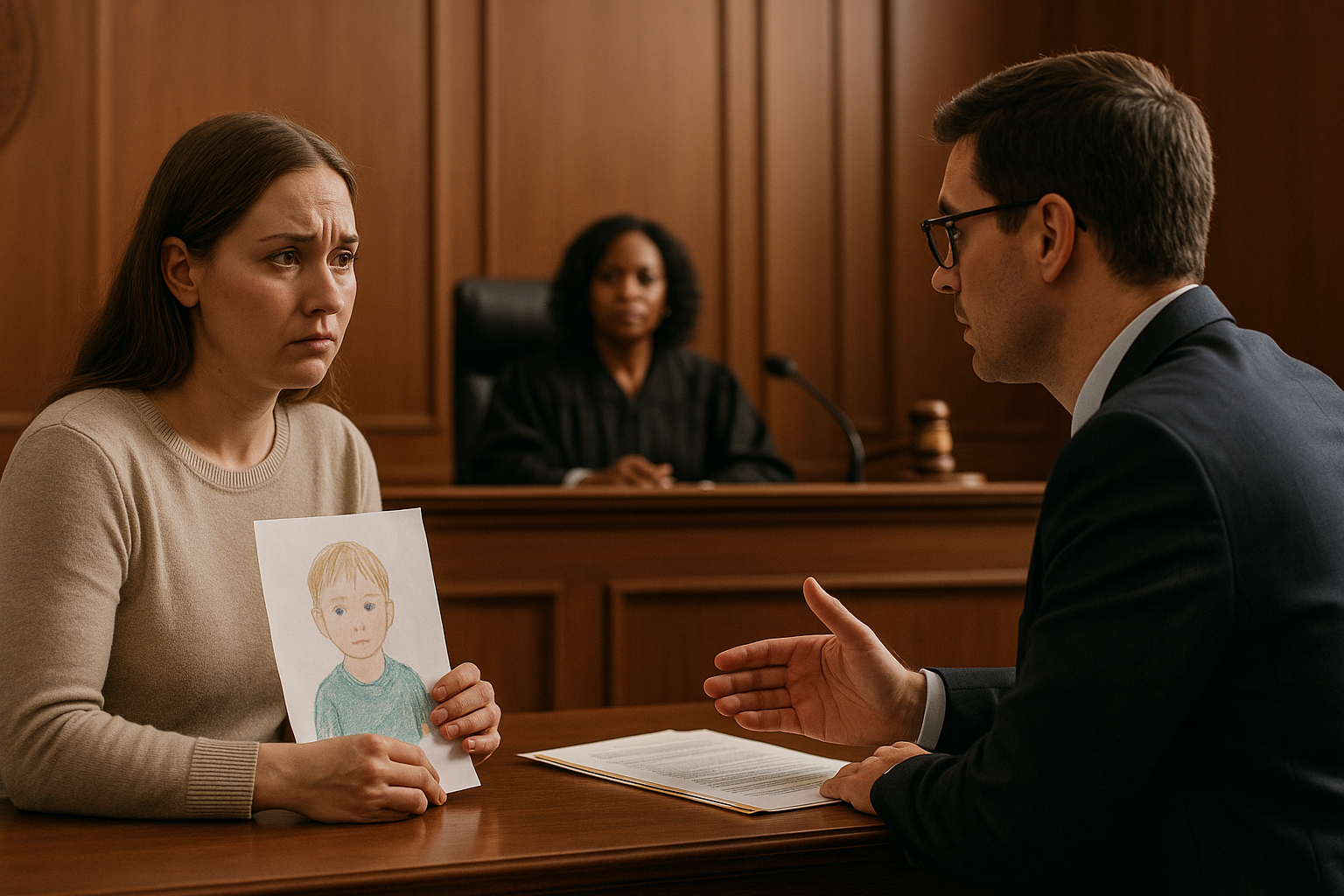When your child faces immediate danger, every minute matters. Parents describe the hours waiting for legal protection as the most terrifying of their lives, but you don’t have to face this alone. Illinois Courts allow parents or guardians to seek emergency custody Orders when a child faces serious and immediate harm.
The family law attorneys at Anderson Boback & Marshall have successfully helped parents secure same-day court protection when children face abuse, dangerous neglect, or removal from the state. We know what Cook County judges, and other Illinois judges, require to grant emergency orders under Illinois law 750 ILCS 5/603.10.
This guide outlines the emergency custody process in Chicagoland courts, the specific evidence that persuades judges to act quickly, and how our experienced attorneys can help you navigate this crisis. Whether you’re dealing with violent behavior, substance abuse, or child abduction threats, understanding these critical steps could make all the difference in protecting your child.
What Qualifies as an Emergency Custody Case in Illinois?
Emergency custody Orders are meant for critical situations, not every day parenting disputes. Under Illinois law (750 ILCS 5/603.10), you must show that your child faces ‘a risk of serious endangerment to their physical, mental, moral, or emotional health.’ The Court will only grant these Orders when this danger is specific and provable.
Examples of Valid Emergency Situations:
- Physical abuse or credible threats of harm
- Active substance abuse in the home that endangers the child
- Serious neglect (lack of food, unsafe housing, unsupervised children)
- Mental health crisis or psychotic behavior by a parent
- A threat that a parent may flee the state with the child in violation of custody orders
Situations that Rarely Qualify as Emergency Custody:
- Disputes over parenting time or drop-off issues
- Poor parenting decisions without real danger
- Unsubstantiated claims with no documentation
Emergency Custody Warning Signs Checklist:
- Domestic violence reports involving the child
- Witnessed substance use around the child
- Dangerous home conditions (filth, exposed wiring, weapons)
- Threats of interstate child removal
If any of these signs are present, it’s essential to consult an experienced domestic relations attorney immediately.
How Quickly Can You Get an Emergency Custody Order in Cook County?
Family Courts in Cook, Lake, DuPage, and Will Counties are equipped to handle emergency custody filings quickly when necessary. In urgent cases, an emergency motion may lead to an ex parte hearing—meaning the judge hears one side’s evidence without waiting for the other parent to appear—if the child is believed to be in immediate danger.
The Fast-Track Timeline:
- Evidence Collection: Photos, medical reports, police records, digital messages.
- Petition Filing: Emergency motion submitted to the court.
- Initial Judicial Review: Judge decides whether to grant an emergency hearing.
- Emergency Hearing: Often held the same day or within 24–48 hours.
- Order Enforcement: If granted, the order is immediately enforceable.
Missing details or vague claims can delay or derail your case. Working with a skilled attorney ensures the court receives a complete, well-supported filing.
What Evidence Helps Win Emergency Custody in Illinois?
The Court’s decision hinges on credible, well-organized documentation. Here’s what makes the strongest impact:
- Police Reports: Prior domestic violence, threats, or child endangerment
- Medical Records: Injuries, substance exposure, or untreated conditions
- Photographs/Videos: Unsafe housing, visible injuries, or neglected surroundings
- Text Messages/Emails/Social Posts: Threats, erratic behavior, admissions
- Witness Statements: From teachers, neighbors, family members
How to Properly Preserve Digital Evidence:
For text messages, emails, and social media, it is important to make sure each message shows a date and timestamp. Ensure proper saving of these communications to use them in Court.
What to Avoid:
- Removing the child without a Court Order unless police advise it
- Confrontations with the other parent
- Emotional exaggerations without proof
At Anderson Boback & Marshall, we help clients package and present emergency evidence to meet the expectations of family court judges in the counties we serve.
For more information about child custody and parental responsibilities in Illinois:
download our comprehensive ‘Guide to Allocation of Parental Responsibilities.
This resource explains your parental rights and the broader custody process that follows emergency proceedings
What Happens at an Emergency Custody Hearing?
Once the judge agrees to hear your case, you’ll appear before the court, sometimes that same day. The hearing is usually brief and focused only on the immediate risk to the child.
When attending your emergency hearing, bring 3 copies of all documentation, dress professionally, prepare to speak concisely (judges often limit emergency presentations to 5-10 minutes), and bring a notepad to document the judge’s specific rulings or questions. At the Daily Center and other courtrooms, cell phones are allowed in the building but must be silenced in courtrooms.
What to Expect at the Hearing:
- You or your attorney will present your evidence
- The judge may ask questions to clarify the urgency
- The Court may issue a temporary emergency Order immediately
Possible Outcomes of the Emergency Custody Hearing:
- Temporary Emergency Custody: Child remains with the petitioner until further hearing
- Supervised Visitation: For the other parent, with strict conditions
- Request Denied: If the Judge finds no immediate danger
Even if the emergency motion is denied, you may still pursue a longer-term custody modification through standard Court processes.
What Comes After the Emergency Order?
Emergency Orders are not permanent. Follow-up proceedings will determine whether the temporary protections stay in place or evolve into long-term custody changes.
Between the emergency order and the return hearing, ensure to keep all communications from the other parent. Collect additional evidence such as school records, medical reports, and supervised visitation summaries. This thorough documentation can significantly strengthen your position during the return hearing.
Key Next Steps After the Hearing:
- Return Hearing: Usually within 14–21 days. Both parents present full evidence.
- Court Investigation: May involve child reps, GALs, or DCFS reviews.
- Order Extension or Modification: Based on updated facts or witness input
- Ongoing Strategy: Adjusting filings, supporting claims, or long-term parenting plans
Our attorneys don’t stop after the first Court win. We help build comprehensive custody strategies to support your child’s ongoing safety and stability.
Why Families in Crisis Choose Anderson Boback & Marshall
We know what’s at stake in emergency custody situations. We act fast, prepare thoroughly, and represent our clients with clarity and compassion. Here’s what sets us apart:
- Extensive Experience with Emergency Petitions: We’ve successfully handled emergency filings across Cook, Lake, DuPage, and Will Counties.
- Same-Day Legal Support: When time is critical, we move quickly.
- Courtroom Credibility: Our team is respected by judges across family courts in the greater Chicago area.
- End-to-End Representation: From emergency hearings to long-term custody arrangements
- Support Beyond the Law: We understand the emotional toll and help clients stay grounded throughout the process
Act Now to Protect Your Child’s Safety
If you’re seeing signs of abuse, neglect, or serious risk, don’t wait. Legal intervention can stop harm before it escalates. Anderson Boback & Marshall attorneys can:
- Explain your emergency custody options
- Prepare and file your motion fast
- Help you present persuasive, court-ready evidence
Reach out today to speak with an experienced attorney who understands the urgency and the law.
Emergency Custody in Chicago: Frequently Asked Questions
Can grandparents or other relatives file for emergency custody in Illinois?
Yes. Illinois law allows grandparents, aunts, uncles, or other close family members to request emergency custody when a child is in immediate danger and the biological parents are unable or unwilling to protect them. To succeed, non-parents must show both that the child faces serious harm from both parents and that the petitioner offers a safer, more stable alternative. Courts in Cook, Lake, DuPage, and Will Counties will also consider the petitioner’s relationship with the child and prior caregiving involvement.
What happens if someone makes false allegations in an emergency petition?
The Courts treat false allegations very seriously. Filing an untrue emergency petition can result in Court sanctions, damage the petitioner’s credibility, and affect future custody rights. Illinois judges expect emergency filings to be backed by credible, verifiable evidence—not emotion or suspicion. That’s why our attorneys thoroughly assess each case before filing, ensuring our claims are well-supported and defensible in court.
What if the other parent takes the child out of state?
If a parent removes a child from Illinois without consent or court approval, it may trigger emergency action under the Uniform Child Custody Jurisdiction and Enforcement Act (UCCJEA). Illinois Courts can issue emergency custody orders even when the child is across state lines, but enforcement may require coordination with law enforcement or court systems in the other state. This is particularly common in contested divorces or custody disputes involving relocation threats.
Will emergency custody change child support automatically?
No. Emergency custody is focused on immediate safety, not financial support. However, if temporary custody becomes more permanent, either party may request a child support modification. Judges will review changes in physical custody, income, and expenses before making a support adjustment. Our attorneys help document these shifts to build strong support modification cases after emergency Orders are in place.
What kind of electronic evidence is accepted in court?
Courts accept texts, emails, social media posts, and voicemails—if they are presented with full context and timestamps. Judges want to see unedited threads, metadata when possible, and proof that the communication is authentic. Selectively edited screenshots can undermine credibility. We guide clients on how to properly preserve and present electronic evidence that meets Court standards.
Is supervised visitation an option in emergency orders?
Yes. Supervised visitation is often granted when the Court finds that a parent poses a risk but should not be fully cut off from the child. The Court can order supervised visits at a neutral location with professional monitors or approved family members. Judges in Cook, Lake, DuPage, and Will Counties may also include additional conditions like substance testing or parenting classes, depending on the case.















